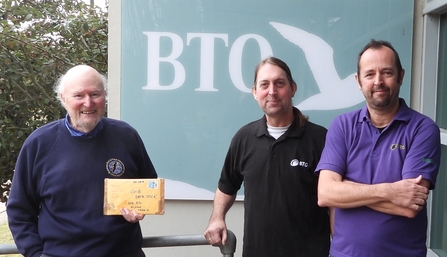On 3 February 2023, the digitised data for the first ten years of the Gibraltar Point Bird Observatory was presented to the British Trust for Ornithology (BTO) at the Bird Observatories Council Annual General Meeting in Thetford. The data set includes 52,000 individual bird records which will be uploaded into BTO’s BirdTrack system where it will be available for research.
52,000 historic bird records made available for research
Gary Mantle

The data was presented by Mike Archer, a long-standing member of the Gib Bird Obs Team (left) to Dave Leech, Head of Ringing and Nest Recording, BTO (centre) and Mark Grantham, Licencing Officer, BTO (right).
The Gibraltar Point Bird Observatory is one of as network of coastal Bird Observatories that collect standardised data on birds through counting and ringing studies. It was set up in 1949, the year after Gibraltar Point became a nature reserve and that the Lincolnshire Wildlife Trust was founded.
Kevin Wilson, Coastal Officer for the Lincolnshire Wildlife Trust, said:
“It’s serendipitous that the handover of this data is occurring during the 75th anniversary year of the Lincolnshire Wildlife Trust – an organisation that was founded by volunteers who cared deeply about the state of wildlife in Lincolnshire. The bird recording at the observatory has largely been carried out by volunteers from the start to the current day and we are incredibly grateful to all of those involved, including Mark and Dave, both of whom have had significant involvement at Gibraltar Point and we congratulate Mike on being awarded the BTO’s Jubilee medal for his work on Bird Observatory data and the encouragement of young birders.”
Mark Grantham, Licencing Officer at the British Trust for Ornithology, said:
"Bird Observatories have a wealth of historical, high-quality data that once digitised can be viewed alongside and, more importantly, directly compared to modern data. The fact that daily logs are complete lists of birds, rather than ad hoc sightings, is it's real value. At a time when climate change impacts are at the forefront of everyone's minds, being able to compare historical arrival and departure dates of migrants to modern trends is incredibly important to better understand these impacts. We're so pleased to see this data now being made available to BTO scientists and look forward to seeing more sets of data coming in from other Observatories."
The records from the first ten years include the first bird ringed at the Observatory, which was a willow warbler on 11 April 1949, ringed by the late Dr Ted Smith CBE the founder of the Observatory and the Lincolnshire Wildlife Trust. Other records include counts on single days of 200 hooded crows, 100 tree sparrows and 83 turtle doves; an incredible migration of blue tits when 500 birds were counted and 184 were trapped and ringed; and 4,000 sanderling on passage in July 1949 – a pattern of occurrence that continues today. The records also show that since the late 1940s, some species have recovered. In that first year, there was only one record of peregrine, two of buzzard and no red kites.
The Gibraltar Point Observatory (left) and the nature reserve, like those across the country, has become an important training ground for Reserve Wardens, Ecologists and Ringers with many starting their vocational journey as volunteers. Mark Grantham has strong links with Gibraltar Point having been a long-term volunteer with Lincolnshire Wildlife Trust before taking up the role as Ringer in Charge at the Observatory. Dave Leech also spent much time at Gibraltar Point and trained for his ringing permit with Mark there.
The bird recording data digitisation project was initiated when funding from Centrica became available, later from EIG Global Energy Partners before it was further supported by the Environment Agency. Mike Archer has worked tirelessly on data checking with other volunteers at Gibraltar Point and at several other Bird Observatories.
